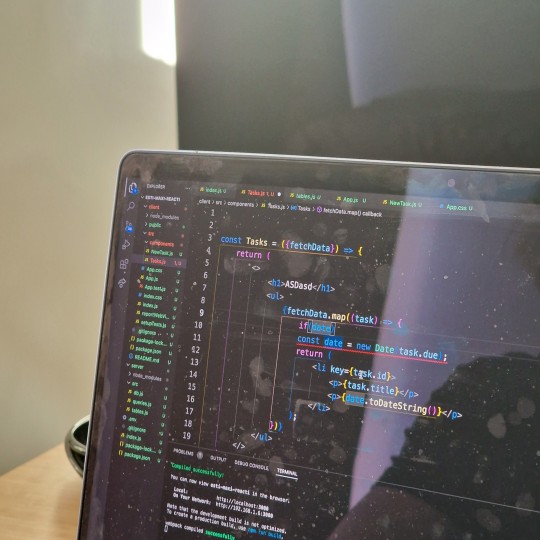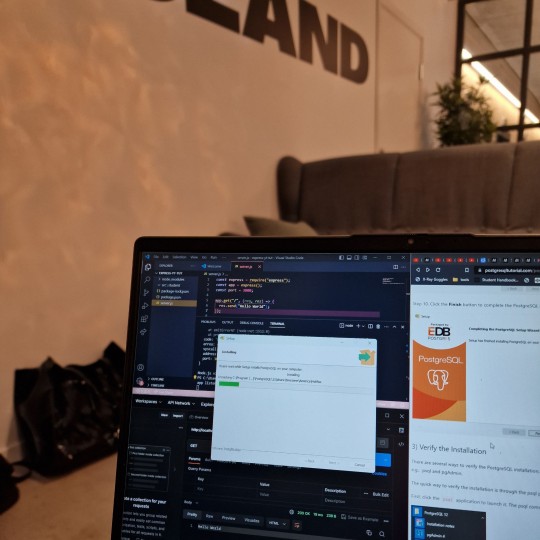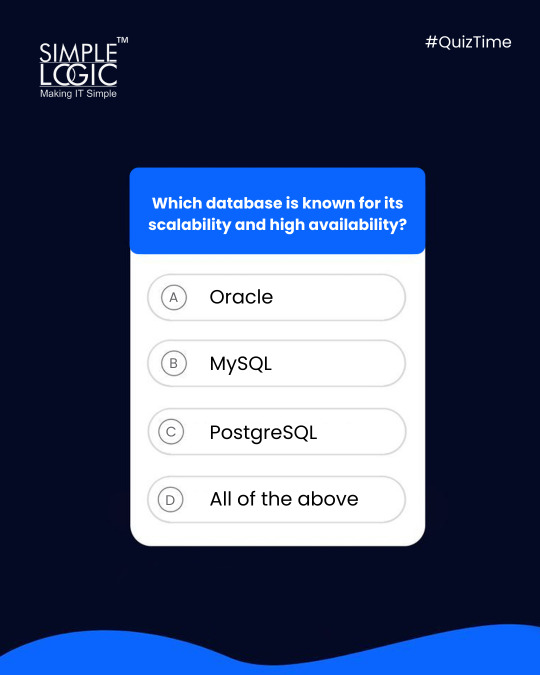#postgresql
Explore tagged Tumblr posts
Text
Wait what... ? this is dangerous knowledge.

32 notes
·
View notes
Text




let today = new Date(11 April 2023);
Life as of recently!!
I'm really enjoying backend stuff since my last two courses have basically just been figma prototyping, but I'm so happy to be back to coding. These weeks of figm-ing have really made me realize that code is where i want to be. But I'm also generally confused lol, it's up and down but i like it. I went bouldering, which is like the official sport of tech lmao. Also top right pic is of a bugged project me and my boyfriend are working on, and its so nice to just sit down and be accountable and confused with someone lol
Good luck with your studies 🌸
#codeblr#studyspo#programming#studyblr#coding#css#python#html#web dev#front end dev#software dev#sql#postgresql
101 notes
·
View notes
Text
a beautiful baby girl named PostgreSQL
3 notes
·
View notes
Text
2 notes
·
View notes
Text
Expert React & Laravel Solutions for Modern Businesses!
#Laravel#LaravelPHP#LaravelDeveloper#LaravelBackend#LaravelFramework#PHPFramework#PHPDeveloper#BackendDevelopment#BackendDeveloper#WebDevelopment#WebDev#PHPBackend#APIDevelopment#RESTAPI#GraphQL#SoftwareDevelopment#MySQL#PostgreSQL#DatabaseOptimization#EloquentORM#QueryBuilder#LaravelSecurity#LaravelSanctum#LaravelPassport#CloudHosting#ServerManagement#DevOps#CodeWithMe#100DaysOfCode#WomenWhoCode
2 notes
·
View notes
Text
Deploying Django Applications to Heroku
Learn how to deploy your Django applications to Heroku with this comprehensive guide. Follow step-by-step instructions to set up, configure, and deploy your app seamlessly.
Introduction Deploying Django applications to Heroku is a streamlined process thanks to Heroku’s powerful platform-as-a-service (PaaS) offerings. Heroku abstracts away much of the infrastructure management, allowing developers to focus on building and deploying their applications. This guide will walk you through the steps to deploy a Django application to Heroku, including setting up the…

View On WordPress
5 notes
·
View notes
Text
With SQL Server, Oracle MySQL, MongoDB, and PostgreSQL and more, we are your dedicated partner in managing, optimizing, securing, and supporting your data infrastructure.
For more, visit: https://briskwinit.com/database-services/
4 notes
·
View notes
Text

#QuizTime Which database is known for its scalability and high availability?
A) Oracle 📊 B) MySQL 🛢️ C) PostgreSQL 🐘 D) All of the above ✅
Comments your answer below👇
💻 Explore insights on the latest in #technology on our Blog Page 👉 https://simplelogic-it.com/blogs/
🚀 Ready for your next career move? Check out our #careers page for exciting opportunities 👉 https://simplelogic-it.com/careers/
#quiztime#testyourknowledge#brainteasers#triviachallenge#thinkfast#quizmaster#knowledgeIspower#mindgames#database#scalability#oracle#mysql#postgresql#data#databaseservices#funfacts#simplelogicit#makingitsimple#makeitsimple#simplelogic
0 notes
Text

Complete Full-Stack Web Development For Free
Become a Full-Stack Web Developer with just ONE course. HTML, CSS, Javascript, Node, React, PostgreSQL, Web3 and DApps
Enroll Now
#free course#full stack developer#free#new year 2025#course#html#html css#javascript#node#react#postgresql#web3#dapps
1 note
·
View note
Text
Top 15 Database for Web Apps to Use in 2025
In 2025, the world of databases continues to evolve rapidly, offering a variety of powerful options to cater to different business needs. Among the top contenders are cloud-native databases like Amazon Aurora and Google BigQuery, which offer high scalability and low-latency performance. These cloud-based solutions are becoming the go-to for businesses that need to manage large-scale web applications and data warehousing. On the other hand, traditional relational databases like MySQL and PostgreSQL still hold strong, offering robust support for transactional systems and a wealth of developer tools. Additionally, NoSQL databases like MongoDB and Cassandra are increasingly popular for handling unstructured data, providing flexibility and speed in applications where scalability and fault tolerance are critical.
As companies continue to prioritize speed, reliability, and seamless integration, the database landscape of 2025 is filled with various solutions that cater to different use cases. Whether you are building a web app, a mobile application, or a data-intensive platform, choosing the right database is critical for ensuring optimal performance and scalability. The right choice ultimately depends on factors such as data structure, speed, and whether you require flexibility for handling big data. To explore more options for databases in 2025.
click here to know more: https://www.intelegain.com/top-15-database-for-web-apps-to-use-in-2025/
0 notes
Text
#PostgreSQL#DatabaseConsulting#PostgreSQLExperts#SQLConsulting#DataManagement#CloudDatabase#DatabaseOptimization#PostgreSQLSupport#TechConsulting#DatabaseSolutions
0 notes
Text
Docker Odoo Connect Local PostgreSQL: Complete Setup Guide for Beginners
Comprehensive tutorial on Docker Odoo PostgreSQL integration. Learn essential setup steps, security configurations, and best practices for deployment. Perfect for DevOps engineers and system administrators.
Are you looking to integrate Docker Odoo with a local PostgreSQL database? This comprehensive guide will walk you through the essential steps of PostgreSQL installation, database configuration, and docker odoo connect local postgresql integration. Moreover, we’ll address common connectivity issues and provide practical solutions for seamless deployment. Getting Started with PostgreSQL…
0 notes
Text
The Mydbops Blog offers expert insights and practical guidance on managing open-source databases such as MySQL, MariaDB, MongoDB, PostgreSQL, TiDB, and Cassandra. It covers topics like performance optimization, security hardening, replication strategies, and the latest trends in database technology. The blog serves as a valuable resource for database administrators and developers seeking to enhance their knowledge and stay updated with industry best practices.
0 notes
Text
I've been feeling bad about my nerd skill atrophy since getting married and having kids and losing the ability to spend a day dicking around on the computer. a couple months ago I noticed the OS on my home server was too old for security updates, so I upgraded to the newest version, which broke both Plex and Subsonic. this has been extra bad because I watch/listen to stuff I've watched/listened to a million times to keep myself on task while I'm doing chores, so with those out of commission I've been watching YouTube and taking an hour to load the dishwasher.
I felt a pang of aptitude last week, so I dug in and started troubleshooting Plex. I searched for error messages in a new way, I guess, because after about 10 minutes I found a suggestion to delete the server from my account, and delete the preferences file from the server. boom, now the kids can watch their shows, and I can watch Mr Show.
Subsonic is harder, because since I started using it, it has forked a few times, so there are way fewer people running it, let alone running it on Tomcat 8 on FreeBSD. so I stepped back and reconsidered: if something else will do the same thing and be easier to setup and maintain, it's better. so, I forgot everything I never really learned about Tomcat (complicated as fuck) and started downloading Python modules.
so now I learned the basics of setting up PostgreSQL, got Supysonic (a Python implementation of the quasi-standard created by the multitude of forks) working better than Subsonic did, and I have new motivation for starting my related personal projects. thank you estrogen!
#trans#trans fem#transfem#technology#freebsd#plex#Python#supysonic#subsonic#postgresql#nerd shit#estrogen#mr show#home server
1 note
·
View note
Text
youtube
0 notes